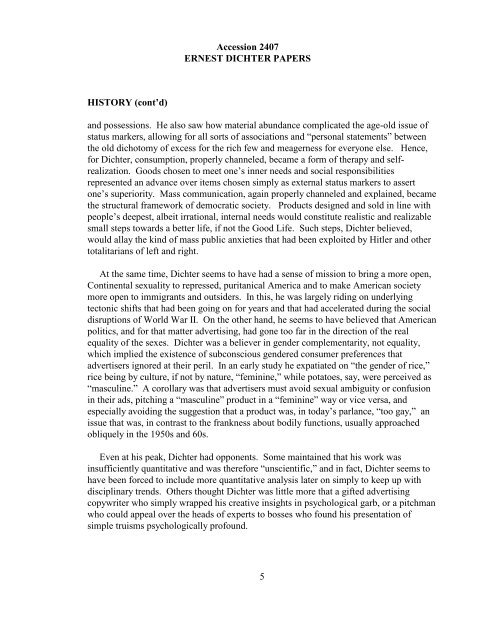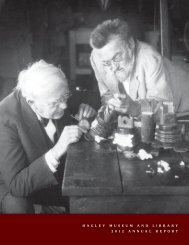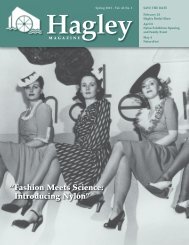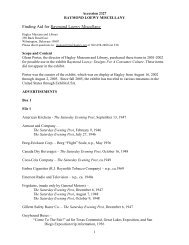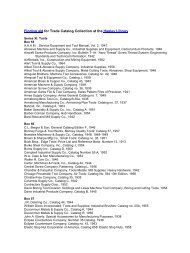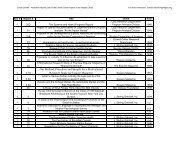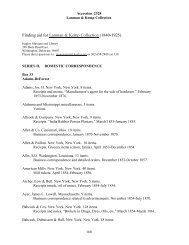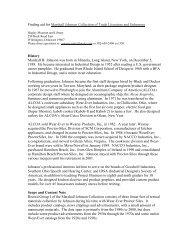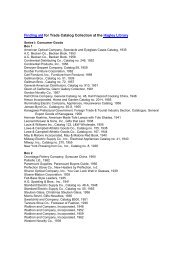Ernest Dichter Papers - Hagley Museum and Library
Ernest Dichter Papers - Hagley Museum and Library
Ernest Dichter Papers - Hagley Museum and Library
Create successful ePaper yourself
Turn your PDF publications into a flip-book with our unique Google optimized e-Paper software.
HISTORY (cont’d)<br />
Accession 2407<br />
ERNEST DICHTER PAPERS<br />
<strong>and</strong> possessions. He also saw how material abundance complicated the age-old issue of<br />
status markers, allowing for all sorts of associations <strong>and</strong> “personal statements” between<br />
the old dichotomy of excess for the rich few <strong>and</strong> meagerness for everyone else. Hence,<br />
for <strong>Dichter</strong>, consumption, properly channeled, became a form of therapy <strong>and</strong> selfrealization.<br />
Goods chosen to meet one’s inner needs <strong>and</strong> social responsibilities<br />
represented an advance over items chosen simply as external status markers to assert<br />
one’s superiority. Mass communication, again properly channeled <strong>and</strong> explained, became<br />
the structural framework of democratic society. Products designed <strong>and</strong> sold in line with<br />
people’s deepest, albeit irrational, internal needs would constitute realistic <strong>and</strong> realizable<br />
small steps towards a better life, if not the Good Life. Such steps, <strong>Dichter</strong> believed,<br />
would allay the kind of mass public anxieties that had been exploited by Hitler <strong>and</strong> other<br />
totalitarians of left <strong>and</strong> right.<br />
At the same time, <strong>Dichter</strong> seems to have had a sense of mission to bring a more open,<br />
Continental sexuality to repressed, puritanical America <strong>and</strong> to make American society<br />
more open to immigrants <strong>and</strong> outsiders. In this, he was largely riding on underlying<br />
tectonic shifts that had been going on for years <strong>and</strong> that had accelerated during the social<br />
disruptions of World War II. On the other h<strong>and</strong>, he seems to have believed that American<br />
politics, <strong>and</strong> for that matter advertising, had gone too far in the direction of the real<br />
equality of the sexes. <strong>Dichter</strong> was a believer in gender complementarity, not equality,<br />
which implied the existence of subconscious gendered consumer preferences that<br />
advertisers ignored at their peril. In an early study he expatiated on “the gender of rice,”<br />
rice being by culture, if not by nature, “feminine,” while potatoes, say, were perceived as<br />
“masculine.” A corollary was that advertisers must avoid sexual ambiguity or confusion<br />
in their ads, pitching a “masculine” product in a “feminine” way or vice versa, <strong>and</strong><br />
especially avoiding the suggestion that a product was, in today’s parlance, “too gay,” an<br />
issue that was, in contrast to the frankness about bodily functions, usually approached<br />
obliquely in the 1950s <strong>and</strong> 60s.<br />
Even at his peak, <strong>Dichter</strong> had opponents. Some maintained that his work was<br />
insufficiently quantitative <strong>and</strong> was therefore “unscientific,” <strong>and</strong> in fact, <strong>Dichter</strong> seems to<br />
have been forced to include more quantitative analysis later on simply to keep up with<br />
disciplinary trends. Others thought <strong>Dichter</strong> was little more that a gifted advertising<br />
copywriter who simply wrapped his creative insights in psychological garb, or a pitchman<br />
who could appeal over the heads of experts to bosses who found his presentation of<br />
simple truisms psychologically profound.<br />
5


